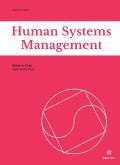Authors: Pook, Laszlo A. | Füstös, János | Marian, Liviu
Article Type:
Research Article
Abstract:
Businesses in advanced economies are rapidly expanding into Central and Eastern Europe. First world managers working in foreign cultures are often surprised by contradictions, which do not fit the rational norms they are used to observing. This paper examines such traditional factors as age, tenure, gender, education, and position at the organization as predictors of job satisfaction in three countries, Hungary, Poland and Romania, emerging from the command economies of the communist era, the significance of employees' beliefs regarding the consequence of the quality of the work they perform on their promotions, and the role played by gender in promotions
…and other rewards offered to employees. Results suggest that in the countries examined here tenure, gender and position occupied, rather than age, play significantly in predicting job satisfaction and advancement, that beliefs about the quality of one's work do not result in advancement, that managers often do not play significant roles in promoting their employees, and that job satisfaction on one factor does not necessarily imply job satisfaction on other factors. Significant gender bias was evident in some of these countries. The authors offer recommendations for managers to follow in these country cultures.
Show more
Keywords: Job satisfaction, satisfaction with rewards, promotion, gender, gender bias, age, tenure, position at work, managerial assistance, quality of work, national culture, Hungary, Poland, Romania
DOI: 10.3233/HSM-2003-22104
Citation: Human Systems Management,
vol. 22, no. 1, pp. 37-50, 2003
Price: EUR 27.50





